
math-basics-for-ai
Math basics course materials
Stars: 64
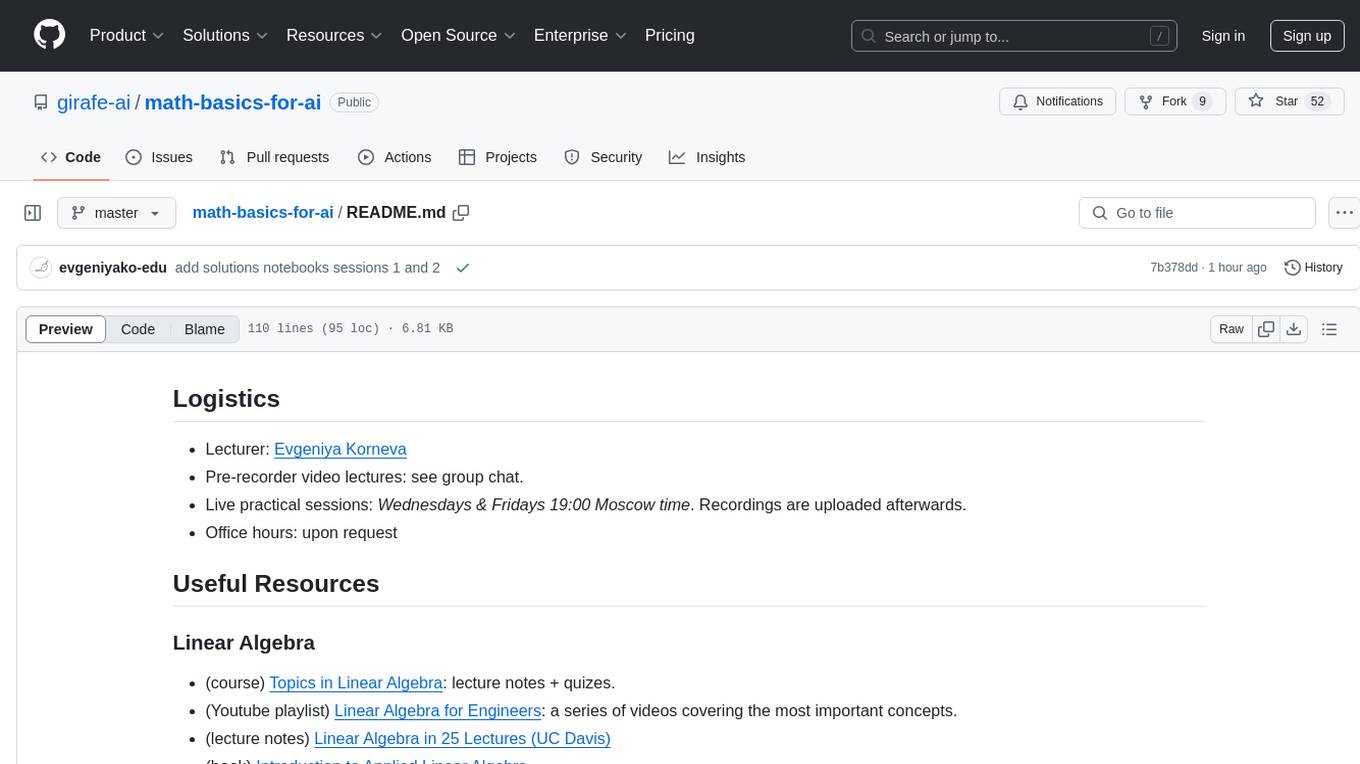
This repository provides resources and materials for learning fundamental mathematical concepts essential for artificial intelligence, including linear algebra, calculus, and LaTeX. It includes lecture notes, video playlists, books, and practical sessions to help users grasp key concepts. The repository aims to equip individuals with the necessary mathematical foundation to excel in machine learning and AI-related fields.
README:
- Lecturer: Evgeniya Korneva
- Pre-recorder video lectures: see group chat.
- Live practical sessions: Wednesdays & Fridays 19:00 Moscow time. Recordings are uploaded afterwards.
- Office hours: upon request
- (course) Topics in Linear Algebra: lecture notes + quizes.
- (Youtube playlist) Linear Algebra for Engineers: a series of videos covering the most important concepts.
- (lecture notes) Linear Algebra in 25 Lectures (UC Davis)
- (book) Introduction to Applied Linear Algebra
- (book) Deep Learning - Part I
- (Youtube playlist) Essence of Calculus
- (lecture notes) Introduction to Differential Calculus [pdf]
- (lecture notes) First Semester Calculus [pdf]
- Learn LaTeX in 30 minutes – an Overleaf guide
- A series of great YouTube tutorials:
- Detexify - draw a symbol you are looking for, and this web will give you its latex representation.
- FINAL EXAM [pdf]LaTeX template][submission form]
- Deadline: Friday, January 24, 18:59 Moscow time
- Graded assignmnet 4 [pdf][LaTeX template][submission form]
- Deadline: Monday, October 21, 23:59 Moscow time
- Graded assignmnet 3 [pdf][notebook (task 2)][LaTeX template][submission form]
- Deadline: Sunday, October 6, 23:59 Moscow time
- Graded assignment 2 [notebook][submission form]
- Deadline: Sunday, September 29, 23:59 Moscow time
- Graded assignment 1 [pdf] [LaTex template][submission form]
- Deadline: Friday, September 20, 18:59 Moscow time
- Welcome quiz [google form]
- Vectors - Pyhton practice:
- Homework:
- watch lectures 1 & 2 (see chat);
- lecture 1 quiz [google form] (not graded).
- Getting familiar with LaTeX:
- Review lecture 2
- Gram-Schmidt process [notebook][solutions]
- Homework:
- Quiz lectures 1 - 3 [google form]
- Quiz review
- Method of least squares
- Python practice [notebook]
- Homework
- watch lecture 4
- graded assignment 1 (deadline Wednesday, September 18, before the class)
- Method of least squares continued
- Homework:
- Quiz: [google form]
- Review quiz lectuures 1-4
- LU, QR and Eigendecompositions
- Homework:
- graded assignment 2 (deadline Sunday, September 29, 23:59 Moscow time)
- Review PCA notebook
- SVD
- Homework:
- graded assignment 3 (deadline Sunday, October 6, 23:59 Moscow time)
- SVD Python practice [notebook]
- watch lecture 6
- Quiz: [google form]
- Univariate functions
- Multivariate functions
- Matrix calculus
- Homework:
- graded assignment 4 (deadline Monday, October 21, 23:59 Moscow time)
For Tasks:
Click tags to check more tools for each tasksFor Jobs:
Alternative AI tools for math-basics-for-ai
Similar Open Source Tools

math-basics-for-ai
This repository provides resources and materials for learning fundamental mathematical concepts essential for artificial intelligence, including linear algebra, calculus, and LaTeX. It includes lecture notes, video playlists, books, and practical sessions to help users grasp key concepts. The repository aims to equip individuals with the necessary mathematical foundation to excel in machine learning and AI-related fields.
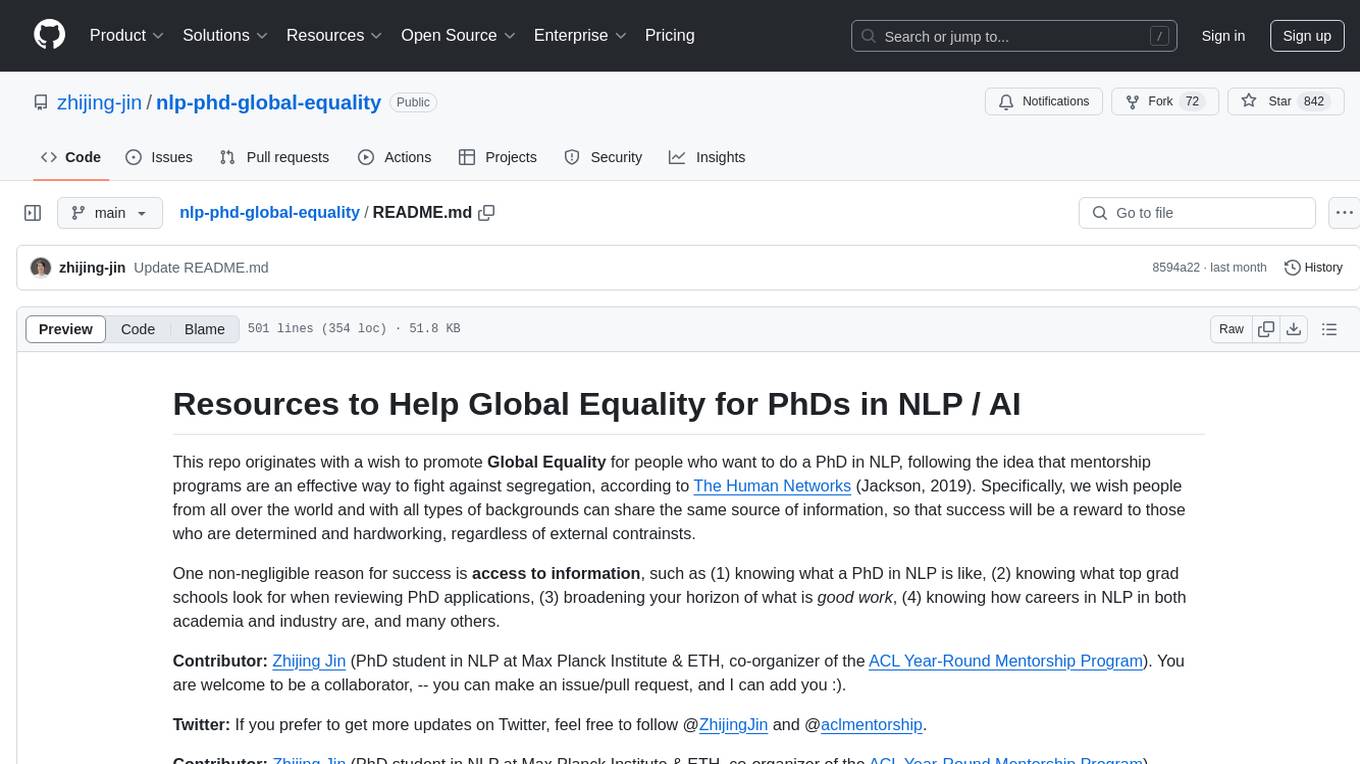
nlp-phd-global-equality
This repository aims to promote global equality for individuals pursuing a PhD in NLP by providing resources and information on various aspects of the academic journey. It covers topics such as applying for a PhD, getting research opportunities, preparing for the job market, and succeeding in academia. The repository is actively updated and includes contributions from experts in the field.
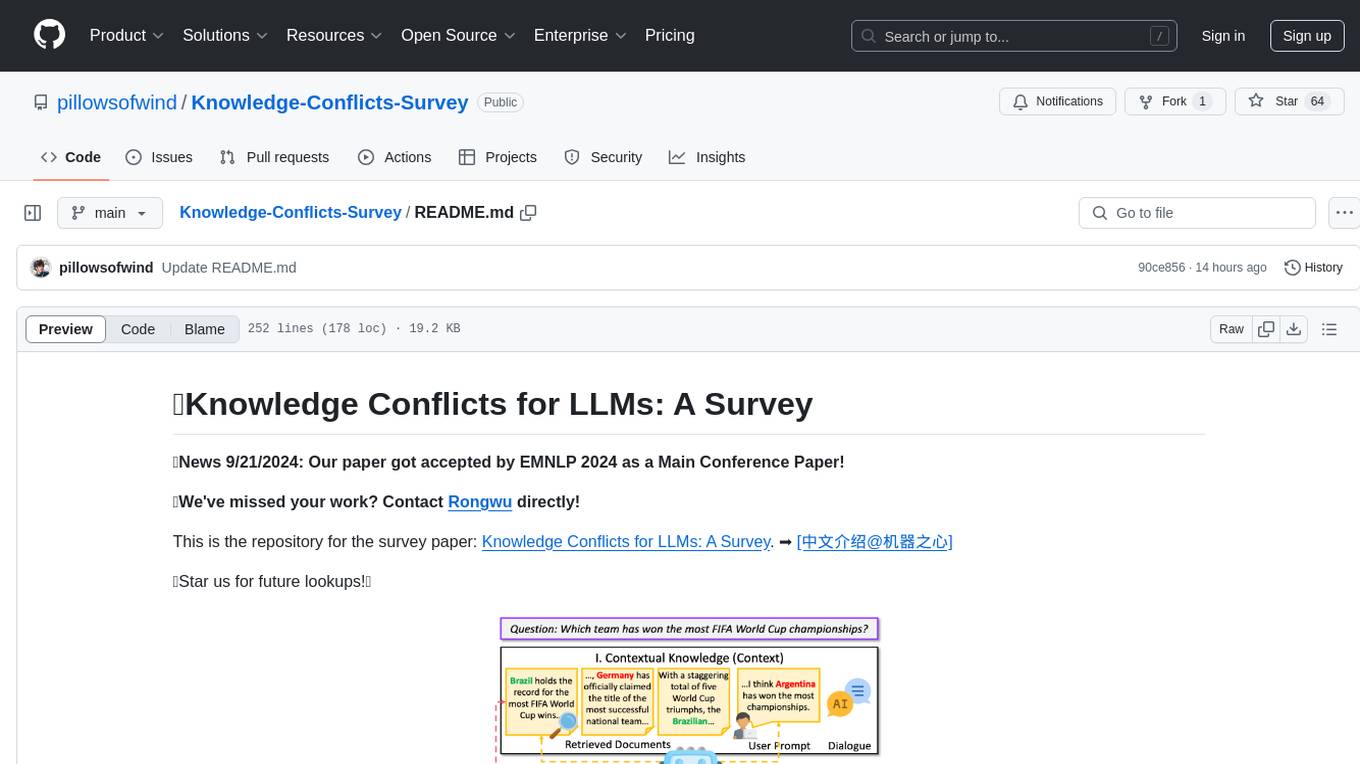
Knowledge-Conflicts-Survey
Knowledge Conflicts for LLMs: A Survey is a repository containing a survey paper that investigates three types of knowledge conflicts: context-memory conflict, inter-context conflict, and intra-memory conflict within Large Language Models (LLMs). The survey reviews the causes, behaviors, and possible solutions to these conflicts, providing a comprehensive analysis of the literature in this area. The repository includes detailed information on the types of conflicts, their causes, behavior analysis, and mitigating solutions, offering insights into how conflicting knowledge affects LLMs and how to address these conflicts.

jd_scripts
jd_scripts is a repository containing scripts for automating tasks related to JD (Jingdong) platform. The scripts provide functionalities such as asset notifications, account management, and task automation for various JD services. Users can utilize these scripts to streamline their interactions with the JD platform, receive asset notifications, and perform tasks efficiently.
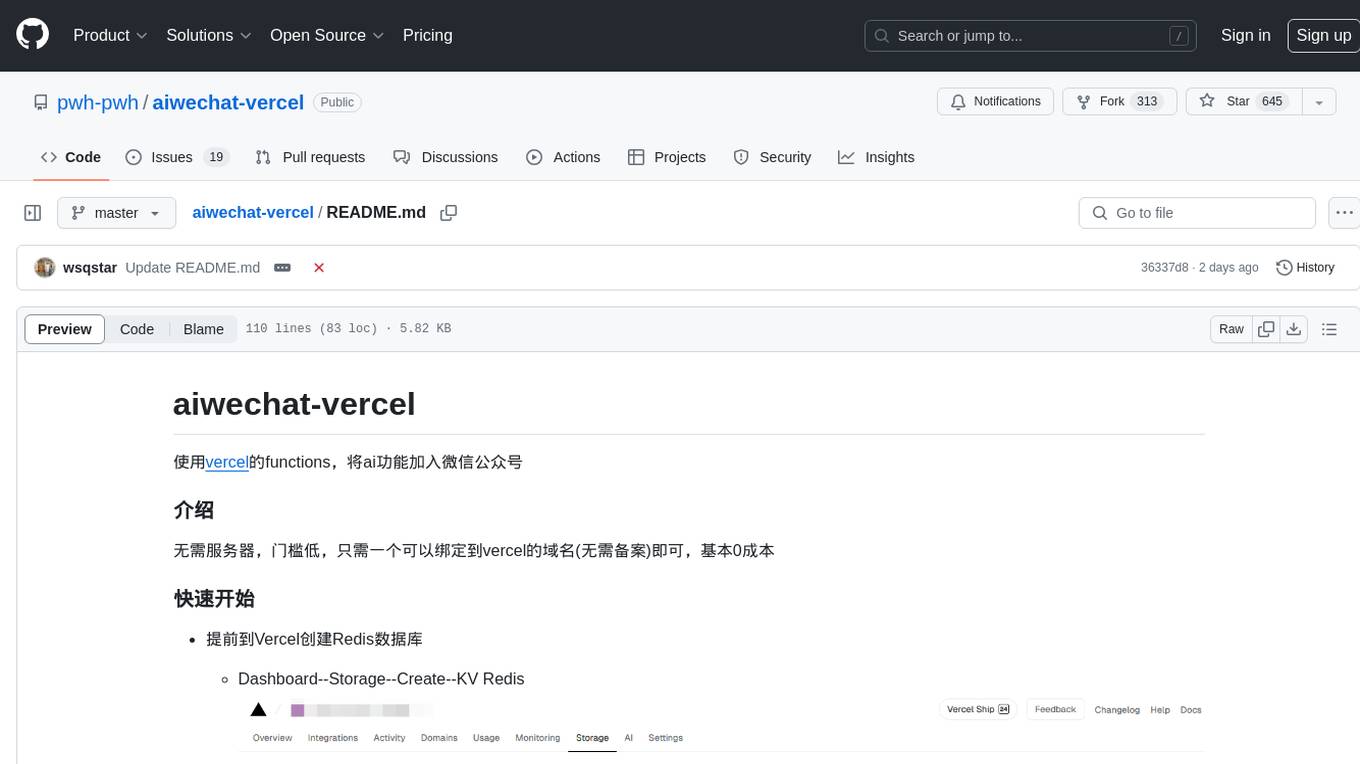
aiwechat-vercel
aiwechat-vercel is a tool that integrates AI capabilities into WeChat public accounts using Vercel functions. It requires minimal server setup, low entry barriers, and only needs a domain name that can be bound to Vercel, with almost zero cost. The tool supports various AI models, continuous Q&A sessions, chat functionality, system prompts, and custom commands. It aims to provide a platform for learning and experimentation with AI integration in WeChat public accounts.
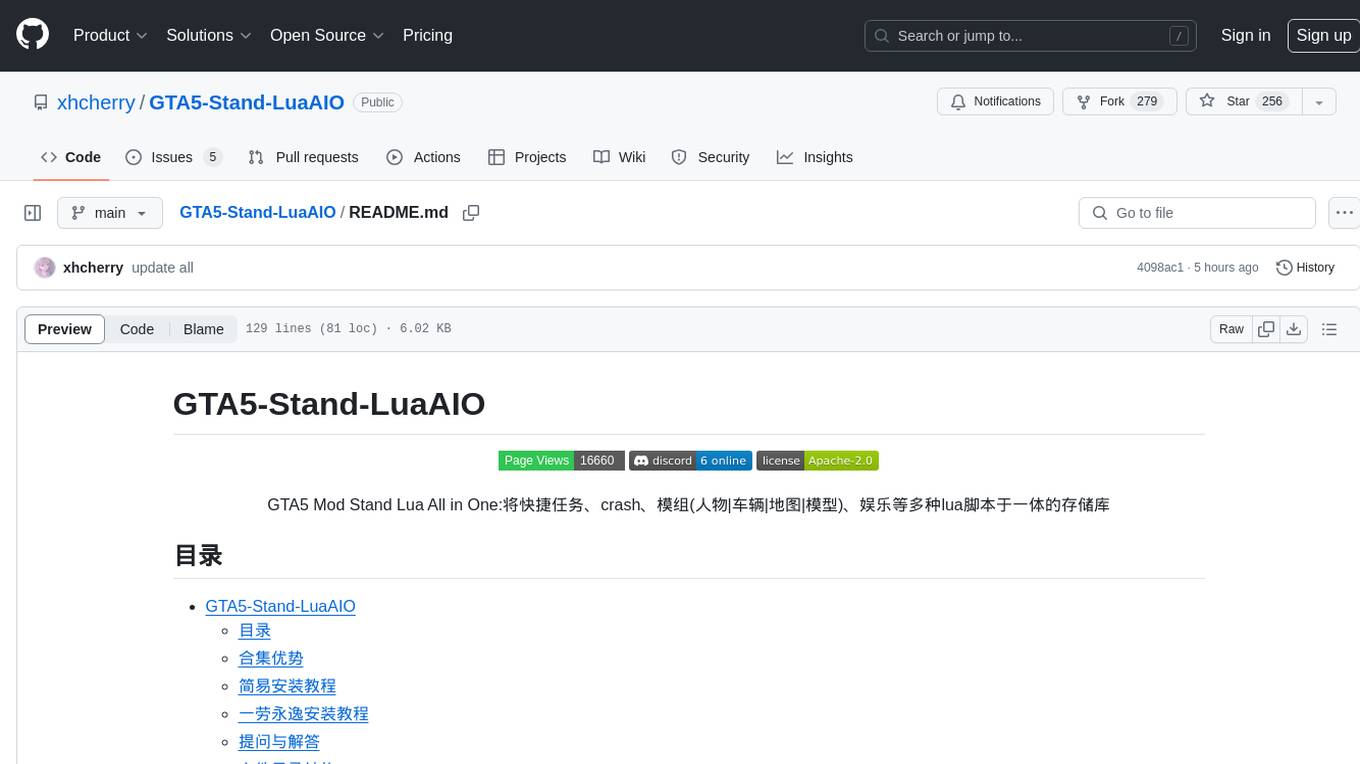
GTA5-Stand-LuaAIO
GTA5-Stand-LuaAIO is a comprehensive Lua script for Grand Theft Auto V that enhances gameplay by providing various features and functionalities. It is designed to streamline the gaming experience and offer players a wide range of customization options. The script includes features such as vehicle spawning, teleportation, weather control, and more, making it a versatile tool for GTA V players looking to enhance their gameplay.
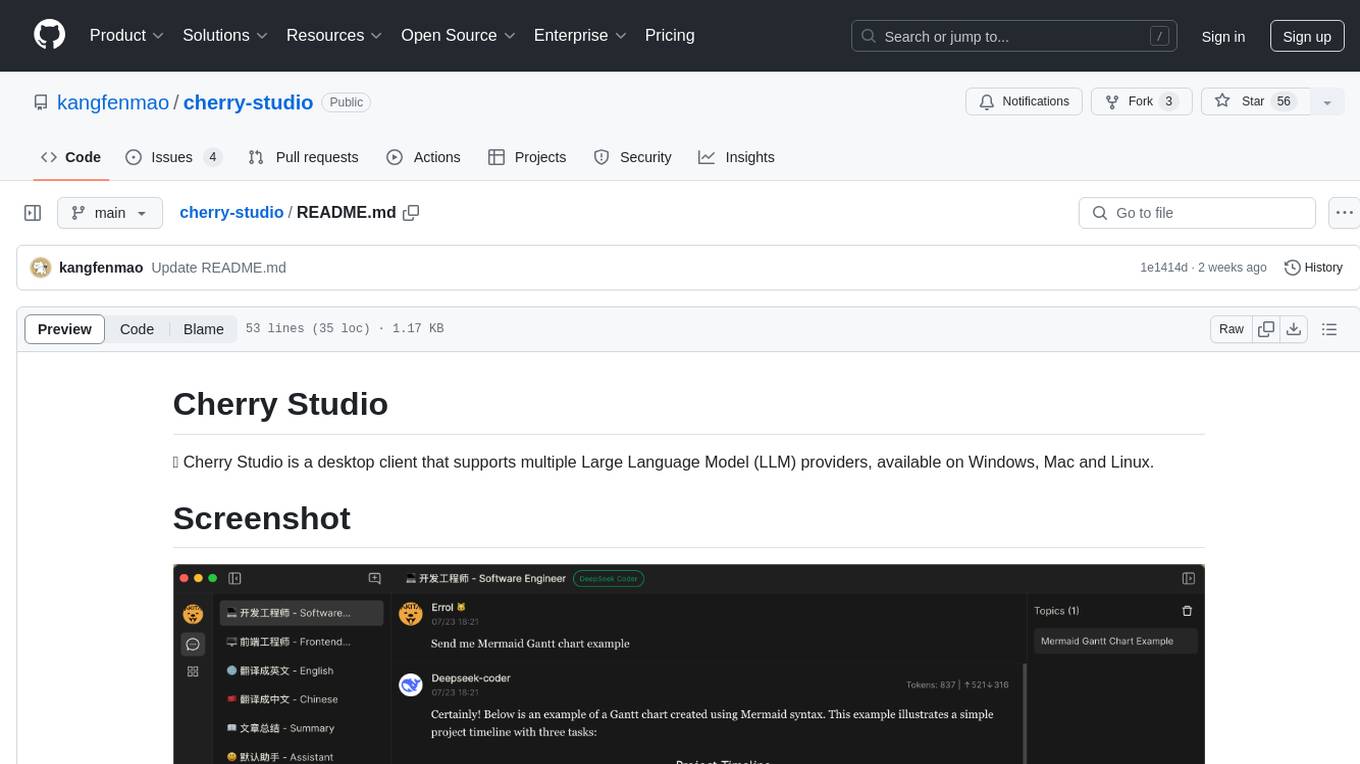
cherry-studio
Cherry Studio is a desktop client that supports multiple Large Language Model (LLM) providers, available on Windows, Mac, and Linux. It allows users to create multiple Assistants and topics, use multiple models to answer questions in the same conversation, and supports drag-and-drop sorting, code highlighting, and Mermaid chart. The tool is designed to enhance productivity and streamline the process of interacting with various language models.
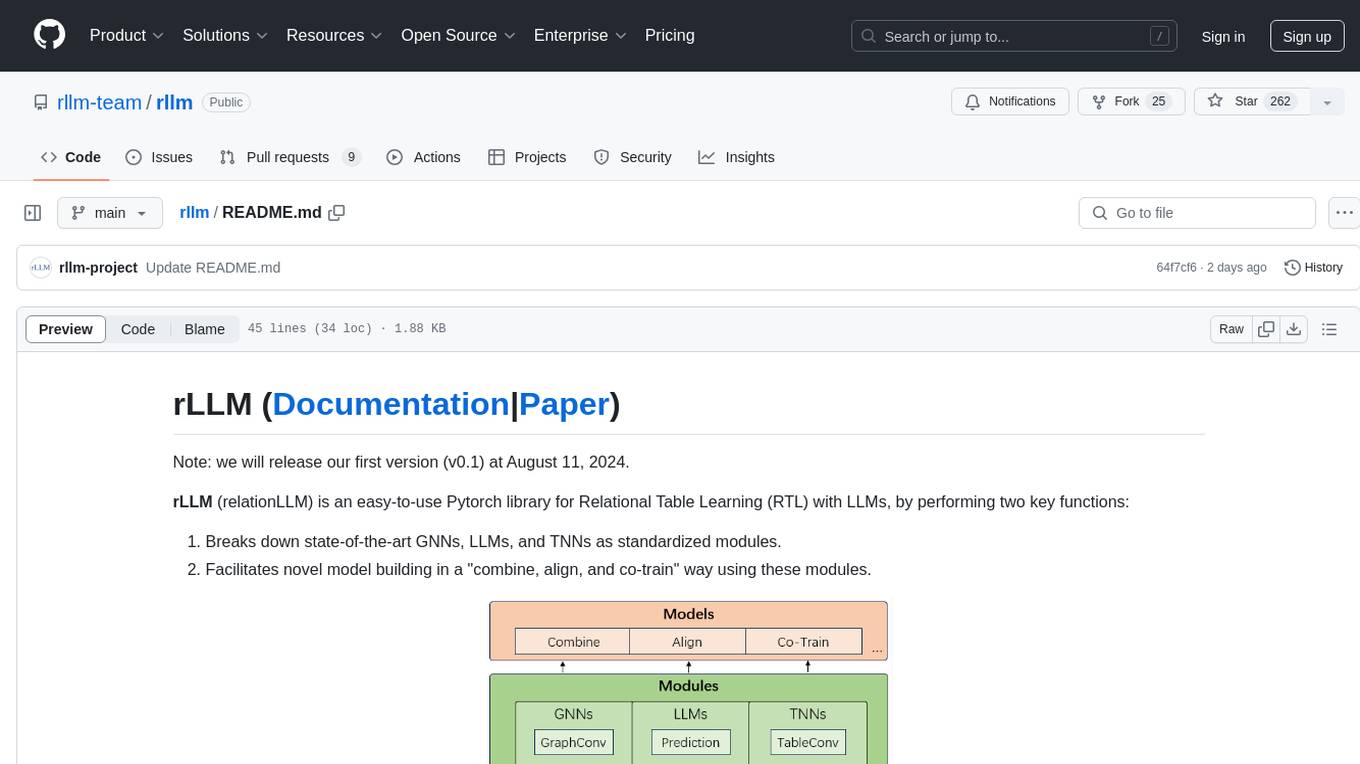
rllm
rLLM (relationLLM) is a Pytorch library for Relational Table Learning (RTL) with LLMs. It breaks down state-of-the-art GNNs, LLMs, and TNNs as standardized modules and facilitates novel model building in a 'combine, align, and co-train' way using these modules. The library is LLM-friendly, processes various graphs as multiple tables linked by foreign keys, introduces new relational table datasets, and is supported by students and teachers from Shanghai Jiao Tong University and Tsinghua University.
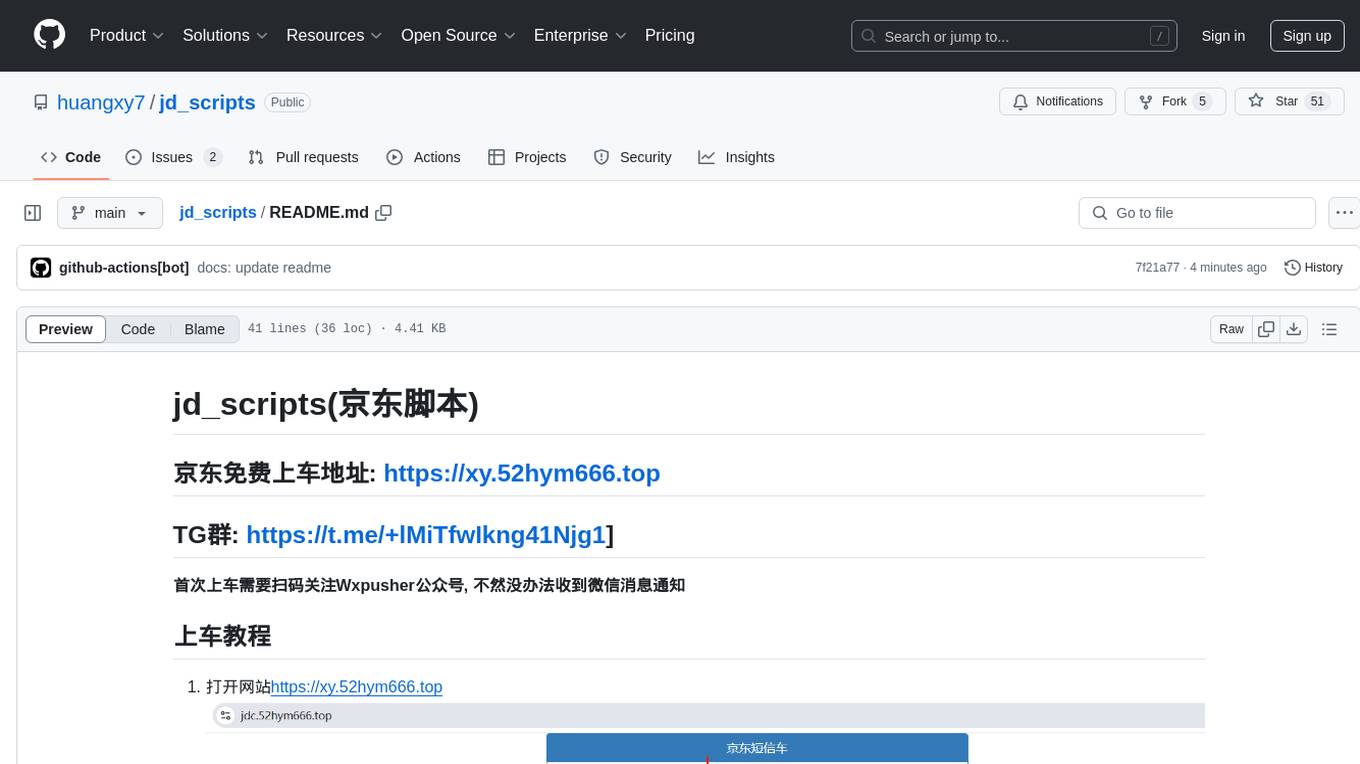
jd_scripts
jd_scripts is a repository containing scripts for automating various tasks on the JD platform. The scripts provide instructions for setting up and using the tools to enhance user experience and efficiency in managing JD accounts and assets. Users can automate processes such as receiving notifications, redeeming rewards, participating in group purchases, and monitoring ticket availability. The repository also includes resources for optimizing performance and security measures to safeguard user accounts. With a focus on simplifying interactions with the JD platform, jd_scripts offers a comprehensive solution for maximizing benefits and convenience for JD users.
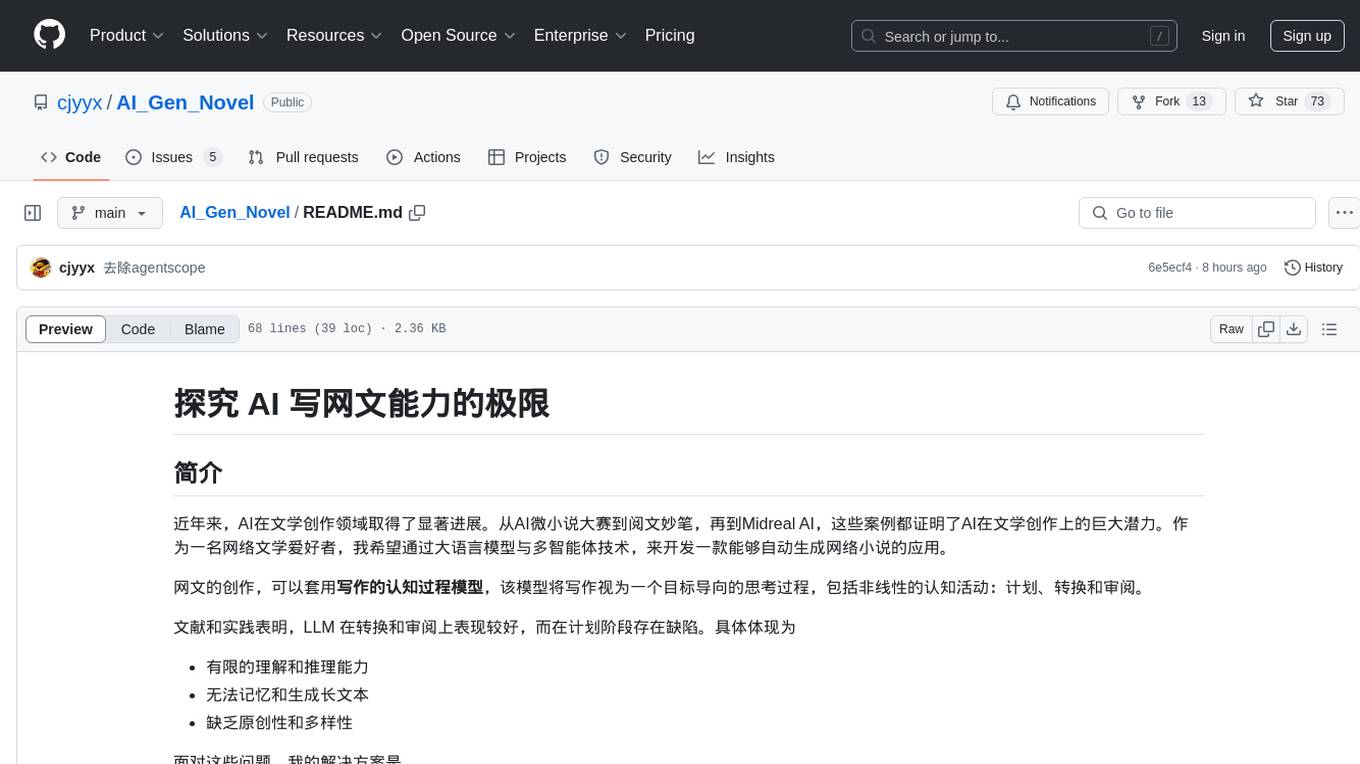
AI_Gen_Novel
AI_Gen_Novel is a project exploring the limits of AI in writing online fiction. Leveraging large language models and multi-agent technology, the tool aims to automatically generate web novels by compressing long texts, optimizing prompts, and enhancing originality. The tool combines the core idea of RecurrentGPT with language-based iterative computation to create texts of any length. Future directions include enhancing model capabilities, optimizing program architecture, and introducing more prior knowledge for structured storytelling.
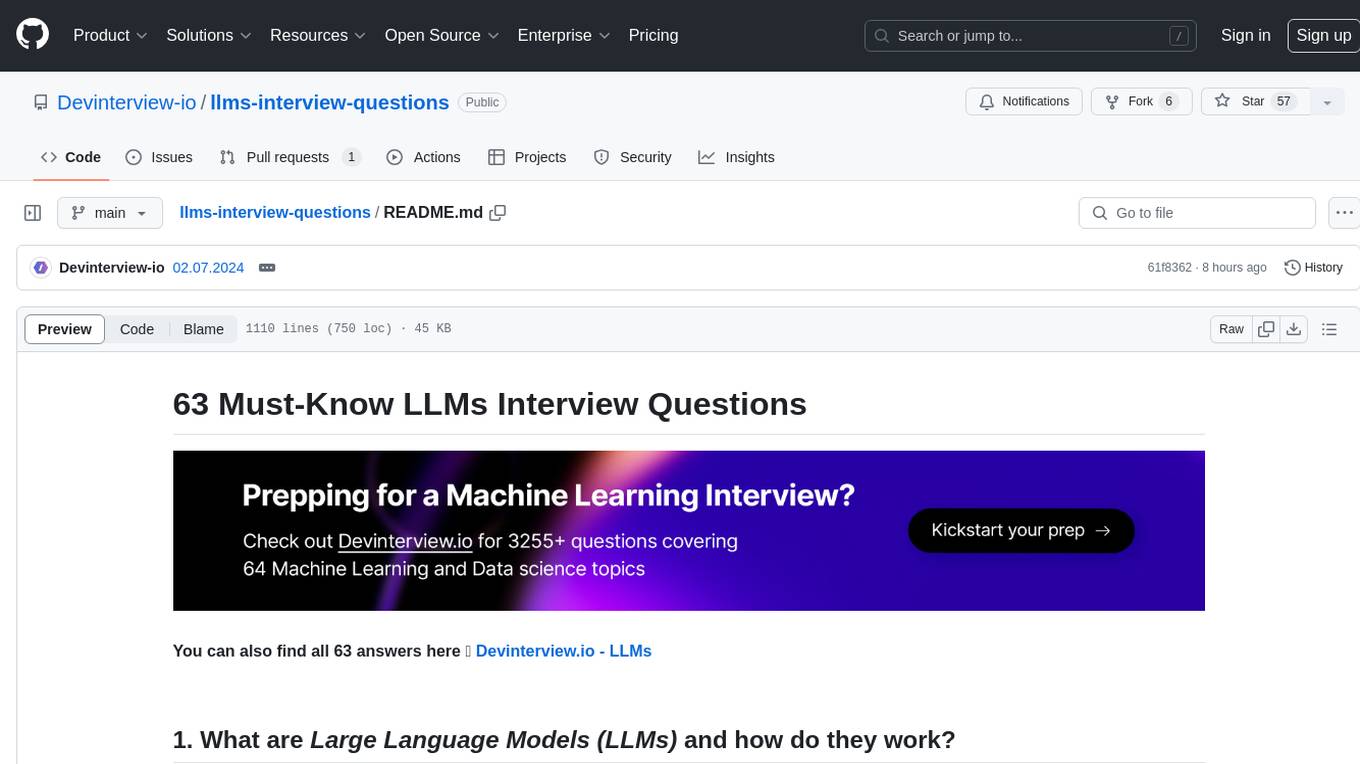
llms-interview-questions
This repository contains a comprehensive collection of 63 must-know Large Language Models (LLMs) interview questions. It covers topics such as the architecture of LLMs, transformer models, attention mechanisms, training processes, encoder-decoder frameworks, differences between LLMs and traditional statistical language models, handling context and long-term dependencies, transformers for parallelization, applications of LLMs, sentiment analysis, language translation, conversation AI, chatbots, and more. The readme provides detailed explanations, code examples, and insights into utilizing LLMs for various tasks.
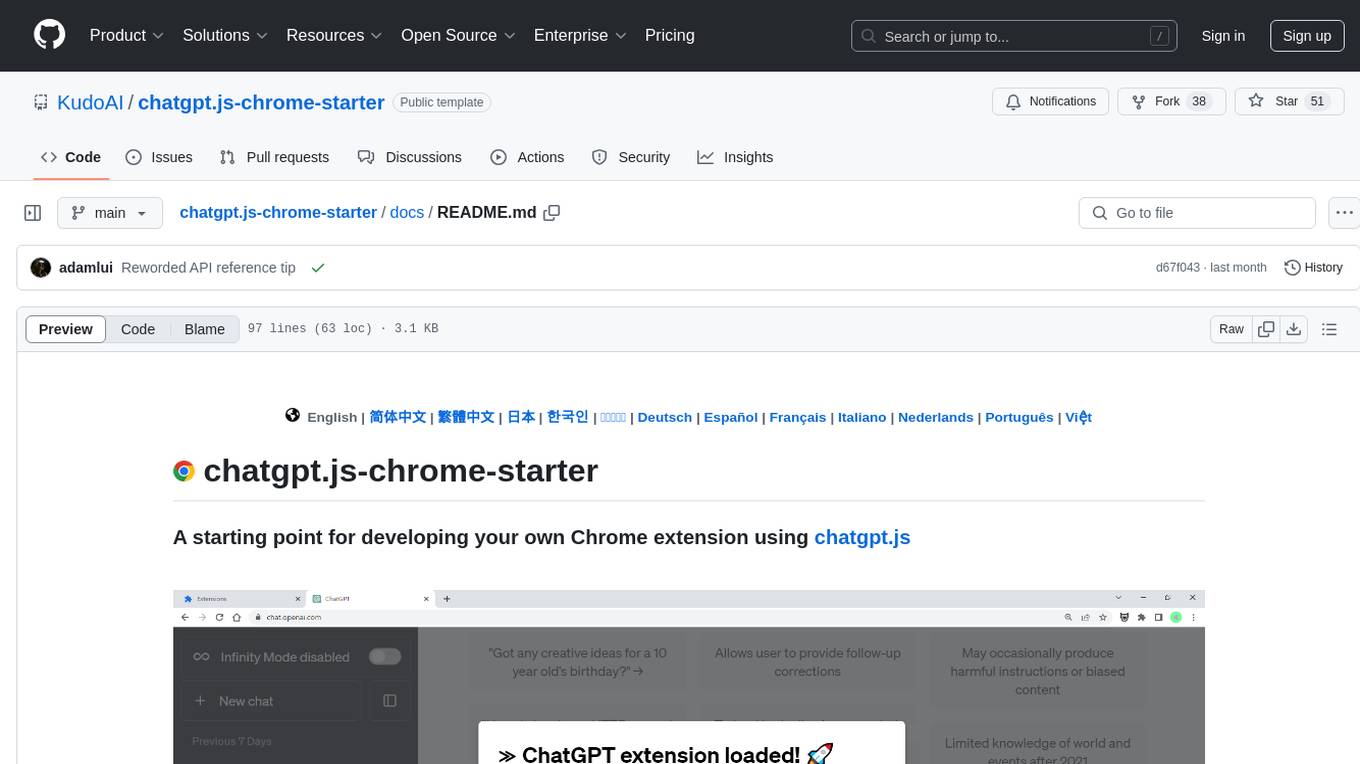
chatgpt.js-chrome-starter
chatgpt.js-chrome-starter is a starting point for developing Chrome extensions using chatgpt.js. It provides a template with installation instructions and tips for creating extensions that leverage the ChatGPT technology. The repository includes sample screenshots and references to advanced Chrome API methods for developers to explore.
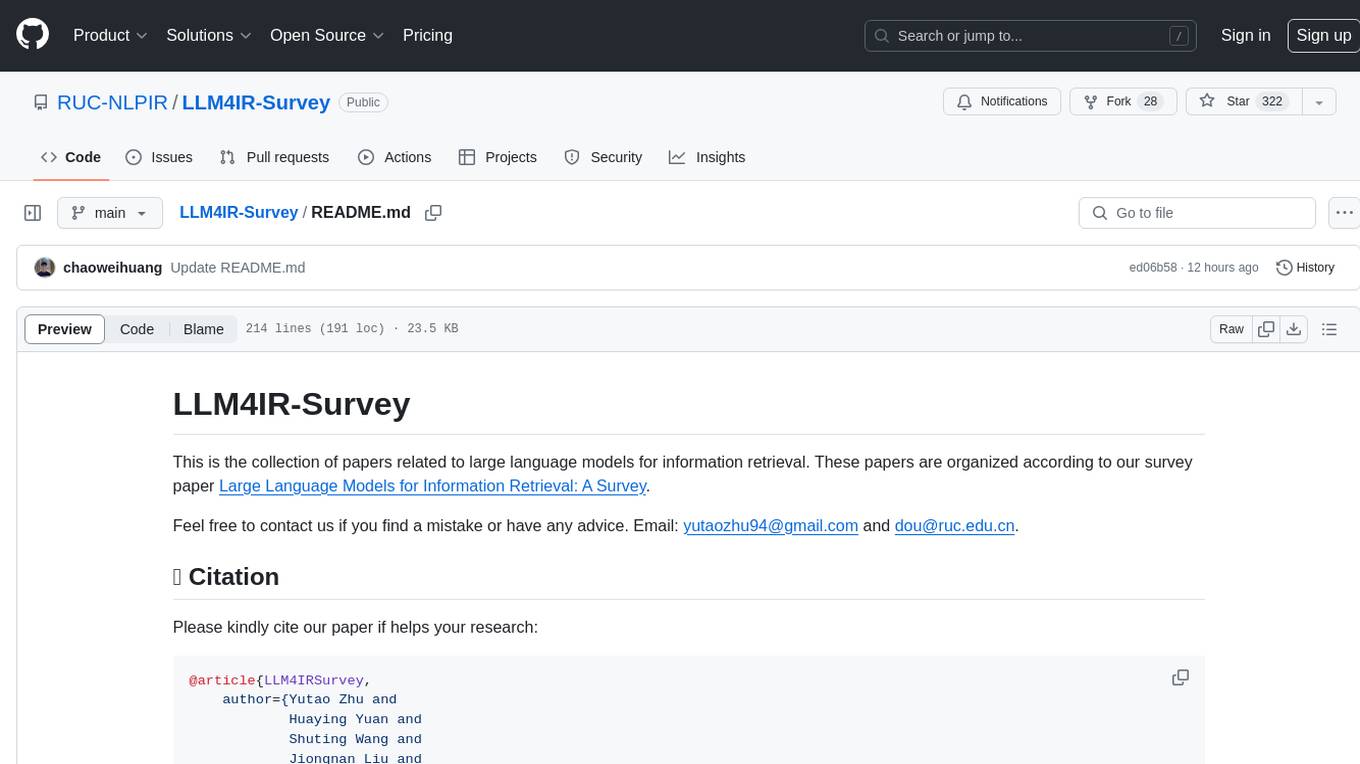
LLM4IR-Survey
LLM4IR-Survey is a collection of papers related to large language models for information retrieval, organized according to the survey paper 'Large Language Models for Information Retrieval: A Survey'. It covers various aspects such as query rewriting, retrievers, rerankers, readers, search agents, and more, providing insights into the integration of large language models with information retrieval systems.
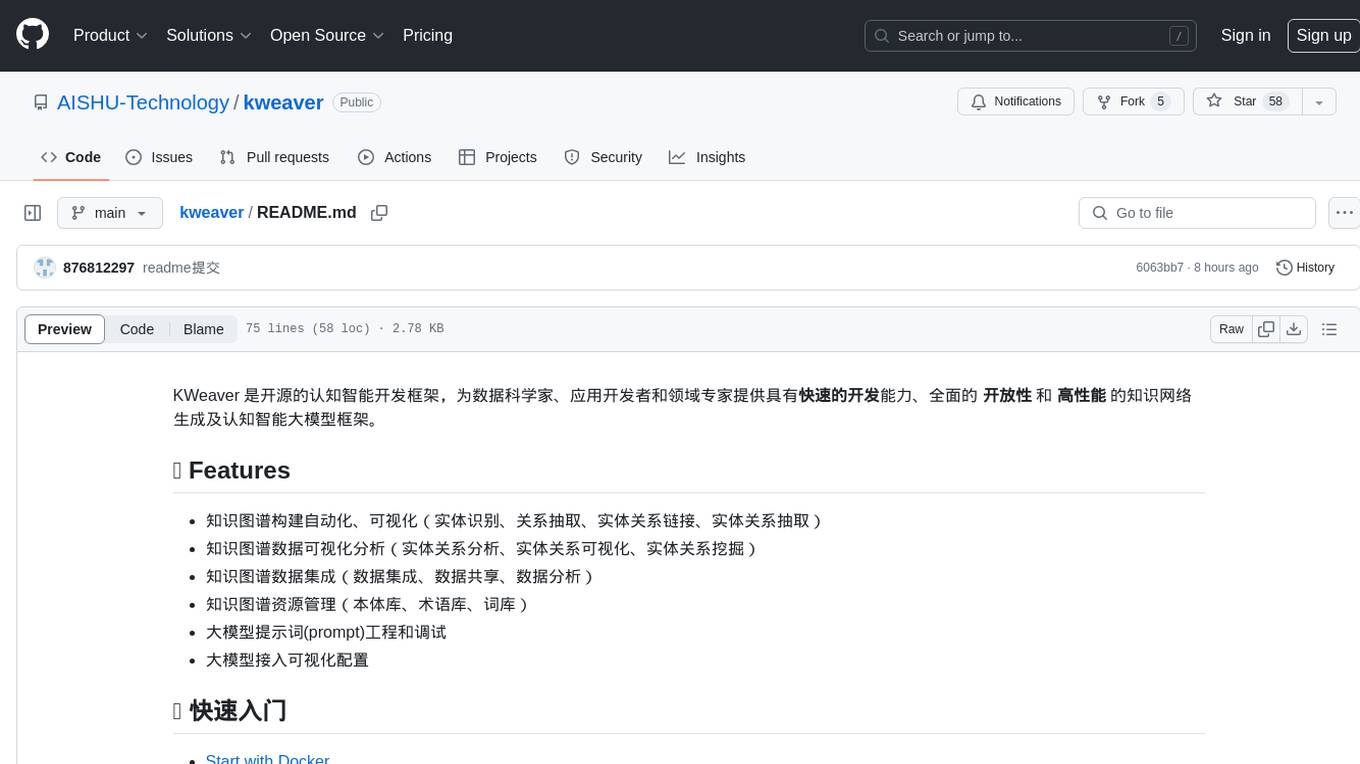
kweaver
KWeaver is an open-source cognitive intelligence development framework that provides data scientists, application developers, and domain experts with the ability for rapid development, comprehensive openness, and high-performance knowledge network generation and cognitive intelligence large model framework. It offers features such as automated and visual knowledge graph construction, visualization and analysis of knowledge graph data, knowledge graph integration, knowledge graph resource management, large model prompt engineering and debugging, and visual configuration for large model access.
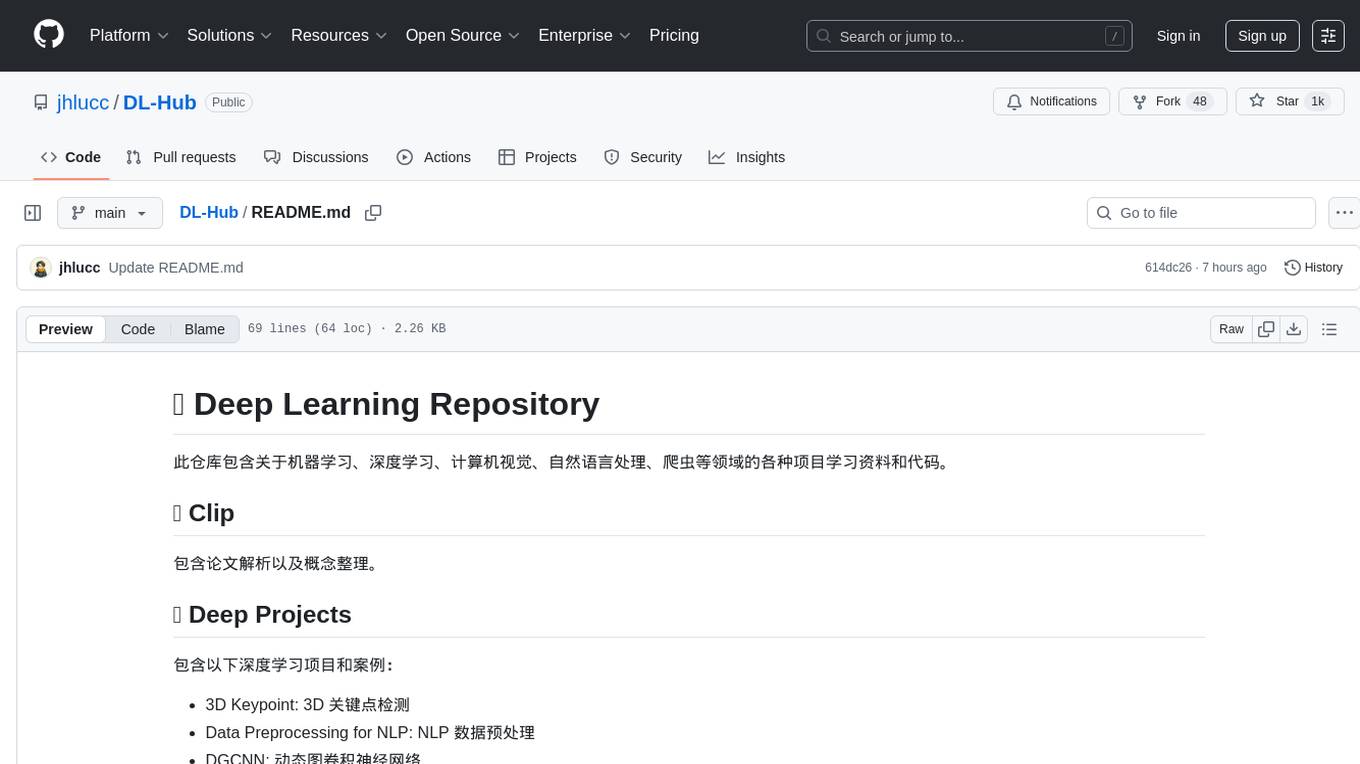
DL-Hub
DL-Hub is a deep learning repository containing various study materials and code projects in the fields of machine learning, deep learning, computer vision, natural language processing, and web crawling. It includes paper analysis, deep learning projects, graph neural network replications, machine learning algorithms, transformer models, and optimization implementations. The repository aims to provide valuable resources for learning and research in the deep learning and machine learning domains.
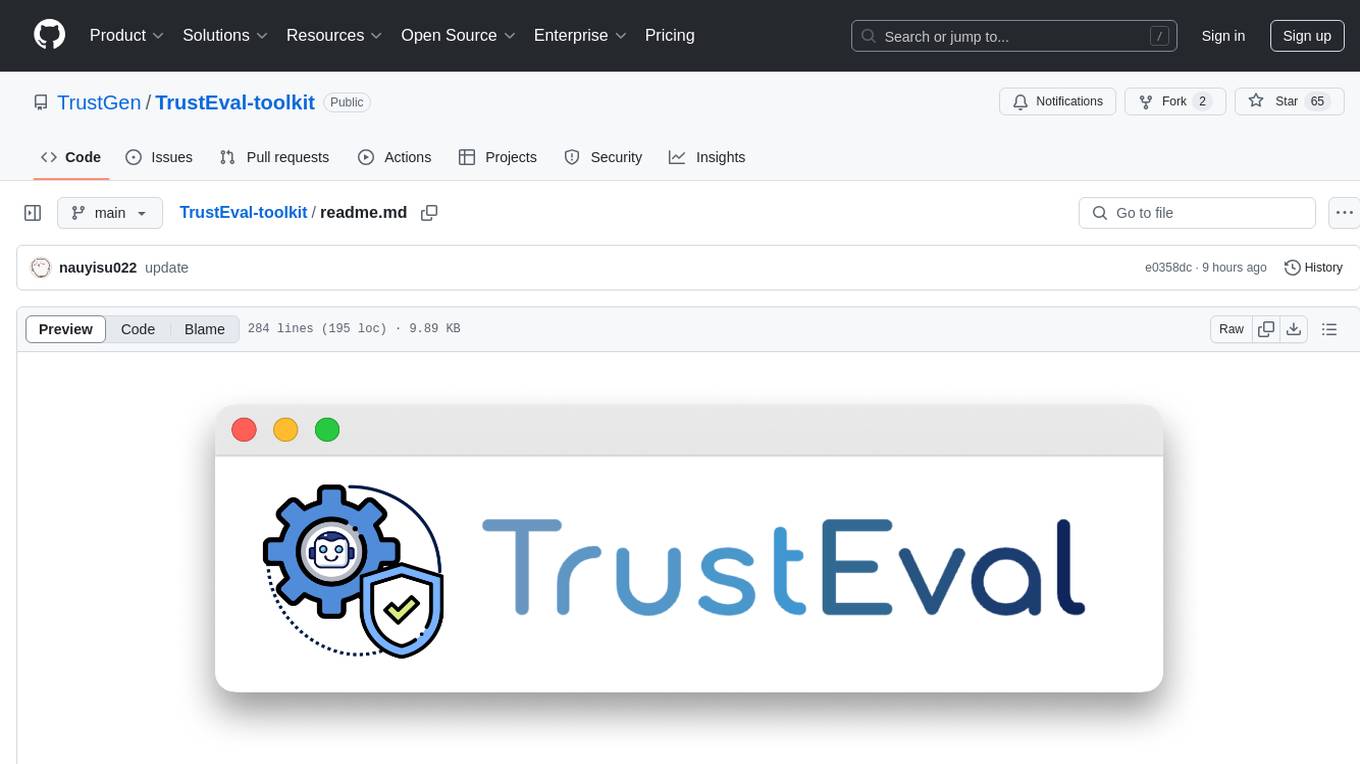
TrustEval-toolkit
TrustEval-toolkit is a dynamic and comprehensive framework for evaluating the trustworthiness of Generative Foundation Models (GenFMs) across dimensions such as safety, fairness, robustness, privacy, and more. It offers features like dynamic dataset generation, multi-model compatibility, customizable metrics, metadata-driven pipelines, comprehensive evaluation dimensions, optimized inference, and detailed reports.
For similar tasks

math-basics-for-ai
This repository provides resources and materials for learning fundamental mathematical concepts essential for artificial intelligence, including linear algebra, calculus, and LaTeX. It includes lecture notes, video playlists, books, and practical sessions to help users grasp key concepts. The repository aims to equip individuals with the necessary mathematical foundation to excel in machine learning and AI-related fields.
For similar jobs

weave
Weave is a toolkit for developing Generative AI applications, built by Weights & Biases. With Weave, you can log and debug language model inputs, outputs, and traces; build rigorous, apples-to-apples evaluations for language model use cases; and organize all the information generated across the LLM workflow, from experimentation to evaluations to production. Weave aims to bring rigor, best-practices, and composability to the inherently experimental process of developing Generative AI software, without introducing cognitive overhead.

LLMStack
LLMStack is a no-code platform for building generative AI agents, workflows, and chatbots. It allows users to connect their own data, internal tools, and GPT-powered models without any coding experience. LLMStack can be deployed to the cloud or on-premise and can be accessed via HTTP API or triggered from Slack or Discord.

VisionCraft
The VisionCraft API is a free API for using over 100 different AI models. From images to sound.

kaito
Kaito is an operator that automates the AI/ML inference model deployment in a Kubernetes cluster. It manages large model files using container images, avoids tuning deployment parameters to fit GPU hardware by providing preset configurations, auto-provisions GPU nodes based on model requirements, and hosts large model images in the public Microsoft Container Registry (MCR) if the license allows. Using Kaito, the workflow of onboarding large AI inference models in Kubernetes is largely simplified.

PyRIT
PyRIT is an open access automation framework designed to empower security professionals and ML engineers to red team foundation models and their applications. It automates AI Red Teaming tasks to allow operators to focus on more complicated and time-consuming tasks and can also identify security harms such as misuse (e.g., malware generation, jailbreaking), and privacy harms (e.g., identity theft). The goal is to allow researchers to have a baseline of how well their model and entire inference pipeline is doing against different harm categories and to be able to compare that baseline to future iterations of their model. This allows them to have empirical data on how well their model is doing today, and detect any degradation of performance based on future improvements.

tabby
Tabby is a self-hosted AI coding assistant, offering an open-source and on-premises alternative to GitHub Copilot. It boasts several key features: * Self-contained, with no need for a DBMS or cloud service. * OpenAPI interface, easy to integrate with existing infrastructure (e.g Cloud IDE). * Supports consumer-grade GPUs.

spear
SPEAR (Simulator for Photorealistic Embodied AI Research) is a powerful tool for training embodied agents. It features 300 unique virtual indoor environments with 2,566 unique rooms and 17,234 unique objects that can be manipulated individually. Each environment is designed by a professional artist and features detailed geometry, photorealistic materials, and a unique floor plan and object layout. SPEAR is implemented as Unreal Engine assets and provides an OpenAI Gym interface for interacting with the environments via Python.

Magick
Magick is a groundbreaking visual AIDE (Artificial Intelligence Development Environment) for no-code data pipelines and multimodal agents. Magick can connect to other services and comes with nodes and templates well-suited for intelligent agents, chatbots, complex reasoning systems and realistic characters.